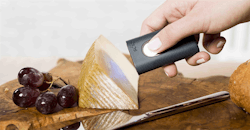An Israeli company has shrunk down a spectrometer to key-chain size, allowing you to check fuel quality and fat content. Kickstarter took down the page, which raised $2.7 million, causing backers to wonder if it's legit or a scam.
In 2014, Tel Aviv-based company Consumer Physics launched a Kickstarter campaign to fund "a pocket-sized molecular sensor" called the SCiO. Point the thumb drive-sized device at an object, say a piece of cheese, press the button and the beam of near-infrared light will bounce back to your smartphone the content of cheese's character, including calories and sugar and fat content. The successful Kickstarter raised $2.7 million, and the company says units are currently being shipped to backers.
If the SCiO's technology sounds familiar, it's because it is essentially a key chain version of a portable spectrometer, something in 10 years you might pick up at a lab equipment trade show sign-in booth. The company hopes to someday install the 1-cm chip in smartphones, which makes a lot of sense.
The SCiO molecular sensor is a pocket-size spectrometer. Photo: Consumer Physics
Before any of this happens, the company needs to resolve a legal dispute that has placed its Kickstarter page in a holding pattern. Backers are already flocking to the mySCiO Facebook page to voice concerns and demand refunds.
The company Facebook page had this to say:
There is a legal dispute in regards to using the term "SCiO" in the product name. The sensor technology is not affected in any way. We are shipping SCiOs to Kickstarter backers at the moment.
Redditt user derekdw333 posted an alleged email backers received to explain in more detail:
Dear SCiO Kickstarter Backers,
You may have learned that our Kickstarter campaign page has been temporarily removed due to an intellectual property dispute. Many thanks to those of you who reached out to us, sharing your support and interest.
We want to assure all of you that this will not effect your SCiO unit, nor the shipment of units to all of our backers.
This legal dispute is not a technology IP issue. This is solely in regards to using the term "SCiO" in the product name. The sensor technology is not affected in any way. As we announced in a Backer update a few weeks ago, units of version 1.1 of the SCiO sensor are currently being packaged and shipped to Backers like you.
We are already addressing the legal dispute over the name of the sensor in court and we fully believe we have every right to use the product name “SCiO.” Lots of companies use the same name without any trademark issues, e.g. Delta Airlines, Delta Faucets, and Delta Gas.
Hopefully Kickstarter will restore our page while the legal action proceeds so that we are not harmed by the mere assertion of a claim. We recognize your desire to keep the community discussions going on the Kickstarter page and we are grateful for your support. Unfortunately, Kickstarter will not even allow us to post updates at this time, thus we need to use a paid email service.
We appreciate your continued support and ask for patience as we work through the legal proceedings surrounding this issue.
Your SCiO units will continue to ship as per the April update.
Thank you, The Consumer Physics Team
The company boasts that the SCiO would be used to build the "first database of matter," as all scanned object info would go to the cloud. That's big talk for a prototype, as is it's claim on Facebook that it's the world's first handheld spectrometer. That's patently false, and kind of a crazy claim; there are hundreds on the market.At around $200, this would be one of the most affordable, though.
Kickstarter has already been hosted some prominent scams, such as the LUCI lucid dreaming machine that raised almost $400,000 before Kickstarter pulled the plug and refunded backers' money.
So could the device be faked in the video below, posted in 2014?
Yes, it probably could, but there's no proof that it's not real. And recently, Bloomberg reporter Ashlee Vance met with comapny founder and CEO Dror Sharon in a Tel Aviv market to test the product on tomatoes and individually wrapped cheese slices.
The SCiO scanned the cheese and came within 1% of the marked calorie content.
"This is like some Star Trek s***!," the reporter exclaims giddily.
So for now, we're also going to remain excited about this technology and the prospective applications. Dror hinted that the sensor could someday be used to read fingerprints, or analyze your bodily waste. The app for that could actually be called Star Trek S***, although they should probably check the naming rights first.
About the Author
John Hitch
Editor, Fleet Maintenance
John Hitch, based out of Cleveland, Ohio, is the editor of Fleet Maintenance, a B2B magazine that addresses the service needs for all commercial vehicle makes and models (Classes 1-8), ranging from shop management strategies to the latest tools to enhance uptime.
He previously wrote about equipment and fleet operations and management for FleetOwner, and prior to that, manufacturing and advanced technology for IndustryWeek and New Equipment Digest. He is an award-winning journalist and former sonar technician aboard a nuclear-powered submarine where he served honorably aboard the fast-attack submarine USS Oklahoma City (SSN-723).


